|
|
|
Sort Order |
|
|
|
Items / Page
|
|
|
|
|
|
|
| Srl | Item |
| 1 |
ID:
098451
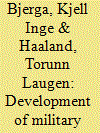

|
|
|
|
|
| Publication |
2010.
|
| Summary/Abstract |
In this article, the development of the Norwegian Armed Forces' Joint Doctrine of 2007 is analysed in order to illustrate some distinct characteristics of the development of small state doctrines. First, small states have limited freedom and limited institutional capacity to realise their own ideas about the use of their military forces. Furthermore, their contribution of forces to multilateral military operations signals political support for an institution (NATO) or a cause, but they are too small to make a real difference to the military operation. Hence, the operational experiences of these forces differ from those of larger countries. The stakes are lower, and they are unlikely to suffer military defeat in a decisive way. They may suffer losses, but they will not lose a war. As a consequence, small state doctrines at the strategic level have become detached from the question of operational effectiveness and are instead utilised for the purpose of promoting political, legal and ethical messages to the military, to a domestic audience, and to international allies.
|
|
|
|
|
|
|
|
|
|
|
|
|
|
|
|
| 2 |
ID:
098449
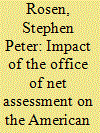

|
|
|
|
|
| Publication |
2010.
|
| Summary/Abstract |
The paper re-examines our understanding of the role played by Andrew Marshall in the development of American thinking about the application of information technologies to military systems and concepts of operation that is commonly referred to as the current Revolution in Military Affairs (RMA). It asks why Andrew Marshall, unlike many other American officials, saw the developments in this area as a potentially discontinuous, systematic change in military practice, rather than an incremental improvement. The paper identifies a range of prior experiences that made Andrew Marshall more sensitive to the possibility of an RMA, including his work on Soviet nuclear doctrine, and his exposure to sources of intelligence about Soviet military thinking in the 1970s and 1980s. It concludes that the 1990-91 Gulf War was not a major factor in the development of his thinking, and that that war, in fact, may have inhibited more innovative thinking about the RMA in the American military in general.
|
|
|
|
|
|
|
|
|
|
|
|
|
|
|
|
| 3 |
ID:
098453
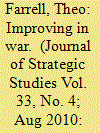

|
|
|
|
|
| Publication |
2010.
|
| Summary/Abstract |
War disciplines militaries: it forces them to refine, and sometimes revise, their tactics, techniques and technologies, or risk defeat in battle. Yet there is no theory of how militaries improve in war. This article develops a theory of military adaptation, which it applies to an analysis of the British campaign in Helmand from 2006 to 2009. Drawing on a wealth of primary sources (military plans, post operation reports and interviews), it shows how British brigades adapted different ways of using combat power to try and defeat the Taliban from 2006-07, and how from late 2007, British brigades have adapted a new population-centric approach that has focused more on influence operations and non-kinetic activities.
|
|
|
|
|
|
|
|
|
|
|
|
|
|
|
|
| 4 |
ID:
098454
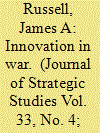

|
|
|
|
|
| Publication |
2010.
|
| Summary/Abstract |
This article analyzes operations by three battalions conducting counterinsurgency, or COIN, operations in Iraq over the period from July 2005 through March 2007: the 1st Battalion, 7th Marine Regiment (1-7) along the Iraq-Syrian border in the first half of 2006; the 1st Battalion, 37th Armored Regiment (1-37) battalion operating in south-central Ramadi in the fall of 2006; and the 2nd Battalion, 1st Infantry Regiment, or 2-1, operating in eastern Mosul in 2005-06. The empirical evidence presented in these cases suggest that, contrary to popular perceptions, the units successfully innovated in war - a process largely executed organically within the units themselves. Innovation is defined here as the development of new organizational capacities not initially present when the units deployed into the theater. The evidence presented in these cases suggests that the innovation process enabled these units to successfully transition from organizations structured and trained for conventional military operations to organizations that developed an array of new organizational capacities for full-spectrum combat operations. The units in this study developed these new capacitites largely on their own initiative.
|
|
|
|
|
|
|
|
|
|
|
|
|
|
|
|
| 5 |
ID:
098450


|
|
|
|
|
| Publication |
2010.
|
| Summary/Abstract |
Chinese strategists believe the Revolution in Military Affairs (RMA) offers a 'historic opportunity' to alter the military balance with the United States. Having long downplayed the People's Liberation Army (PLA)'s capabilities and aims, China is now publicizing its capacity to inflict damage while cultivating uncertainty about its precise intentions to induce caution in adversaries. Key dimensions of China's RMA include complementary kinetic and information attacks and the substitution of 'information deterrence' for nuclear deterrence. Contrary to earlier analyses focused on a decisive surprise strike, current journal articles emphasize the need for 'serialized' information and kinetic attacks. Chinese strategists may err in three ways, however: They may underestimate US resilience; they may overestimate the PLA's ability to conduct 'warfare engineering'; and China's peacetime preparations for the RMA may incite an unexpected response.
|
|
|
|
|
|
|
|
|
|
|
|
|
|
|
|
| 6 |
ID:
098452
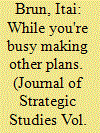

|
|
|
|
|
| Publication |
2010.
|
| Summary/Abstract |
This study argues that, in parallel to the developments in the West over the last three decades, several nations and organizations on 'the other side of the hill' have also undertaken a significant development in their military thought. This conceptual development is referred to in the study as the 'Other RMA' ('O-RMA'). This study aims to identify and describe O-RMA, to analyze the learning process that led to it and to trace its intellectual origins. This 'way of war', whose roots lie in a series of dramatic and tumultuous events that took place in the Middle East between the years 1979 and 1982, is based on the following components: Improving absorption capability, in order to increase survivability and provide a breathing space for the 'weaker side', creating effective deterrence, in order to deter the 'stronger side' from attacking the 'weaker side' and shifting the war to more convenient areas in case this deterrent fails; and winning the war by not losing it, while creating an attrition effect. O-RMA is an exceptionally eclectic conception and its development was not intentional or systematic. This study claims that the main ideas that underlie this conceptual development evolved within the different elements, while maintaining a common image, concerning the military, technological, economic, social and political developments in the West during the 1990s.
|
|
|
|
|
|
|
|
|
|
|
|
|
|
|
|
|
|
|
|
|